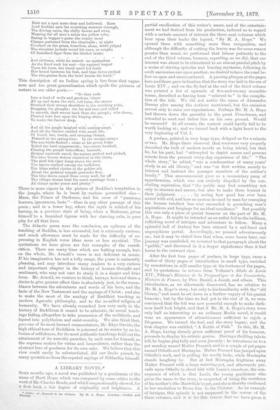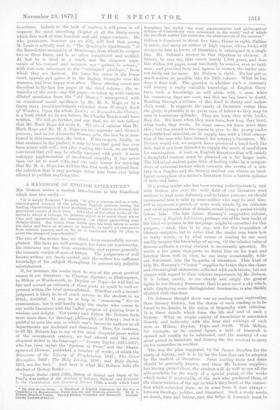A LIBRARY NOVEL.*
SomE months ago, a novel was published by a gentleman of the name of Mark Hope, which was compared by some critics to the -work of Mr. Charles Heade, and which unquestionably showed, for a first book, a fair degree of originality and brightness. A • Louis; or, Doomed to the Moister. By M. A. Hope. London: Griffith and learran.
partial recollection of this writer's name, and of the entertain- ment we had derived from his production, induced us to regard with a certain amount of interest the three neat volumes which bear upon their backs the legend, "By M. A. Hope." We opened them with something more than resignation, and although the difficulty of cutting the leaves was for some reason greater than usual, we performed that labour patiently to the end of the third volume, because-, expecting, as we did, that our interest was about to be stimulated to an almost painful pitch by a series of stirring episodes and bracing mysteries, following in swift succession one upon another, we desired to have the road be- fore us open and unencumbered. A passing glimpse at the pages here and there gave indication that the story was laid in the era of Louis XIV. ; and on the fly-leaf at the end of the third volume was printed a list of upwards of five-and-twenty recondite tomes, described as having been "referred to" in the compila- tion of the tale. We did not notice the name of Alexandre Dumas pre among the authors mentioned, but the omission served only to raise our expectations. Perhaps Mr. M. A. Hope had thrown down the gauntlet to the great Frenchman, and intended to meet and defeat him on his own ground. Would he succeed? At all events, the contest could hardly fail to be worth looking at ; and we turned back with a light heart to the very beginning of Vol. I.
A preface, printed in very large type, delayed us for a minute or two. Mr. Hope there observed that reviewers very properly described the bulk of modern novels as being trivial, but that he, for his part, had "attempted to depict scenes and persons remote from the present every-day experience of life." "The whole story," he added, "was a condensation of many years' study in an old library," and was "at first written merely to ' interest and instruct the younger members of the author's family." This announcement gave us a momentary pang of apprehension, which was not entirely dispelled by the con- cluding aspiration, that "the public may find something not only to interest and amuse, but also to make them lenient in
their judgment by seeing how good has ever been . mixed with evil, and how no system devised by man for cramping the human intellect has ever succeeded in quenching man's aspirations and longings for an ideal excellence." But possibly this was only a piece of quaint humour on the part of Mr. M. A. Hope. It might be intended as an artful foil to the brilliant, rollicking novel of intrigue and adventure to follow. Many a splendid hall of fantasy has been entered by a sad-hued and unpropitious portal. Accordingly, we pressed adventurously on ; but it may be stated here that when, some hours later, our journey was concluded, we reverted to that paragraph about the "public," and discerned in it a deeper significance than it had borne to the outward view.
After the first four pages of preface, in largo type, came a matter of thirty pages of introduction in small type, enriched by annotations in still smaller type at the bottoms of the pages, and by quotations in extenso from Voltaire's Sibale de Louis XIV., Pithon's Histoire de la Pragmatique et des Concordats, Histoire de France, by Pere Daniel, a Jesuit, and others. This introduction, as we afterwards diseovered, has no relation to Mr. M. A. Hope's story, but only to his familiarity with the "old library," and must be set down as a further vagary of his quaint humour ; but by the time we had got to the end of it, we were convinced that the foil was now powerful enough to make dark- ness itself look bright, and that if Mr. M. A. Hope's story were only half as interesting as an ordinary Mudie novel, it would wear an appearance of attractiveness sufficient to cajole a Diogenes. We turned the leaf, and the story began ; and the first chapter was entitled, "A Kettle of Fish." In this, Mr. M. A. Hope, having already given sufficient proof of his humour, proceeds to display his artistic genius. Having a thrilling tale to tell, he begins playfully and even jocosely ; he introduces us to a pet monkey named Maitre Frocard, and to a couple of pot pages named Othello and Mustapha. Maitre Frocard has jumped upon Othello's neck, and is pulling his woolly locks, while Mustapha stands laughing by. But at last Mustapha frightens away Maitre Frocard with a largo watering-pot, and afterwards pre- vails upon Othello to shoot him with Louis's crossbow, the con- sequence of which is that Louis, the young gentleman who gives the name to the story, is suspected of being the murderer of his mother's (the Marechale's) pet, and she is thereby confirmed
in her resolution to Doom him to the Cloister. As an example of intrigue, this episode is not surpassed in the course of the three volumes, and it is for this reason that we have given it in °Wens°. Indeed, to the bulk of readers, it will prove in all respects the most absorbing chapter of all the thirty-seven
which this work of nine hundred and odd pages contains. He who perseveres, however (as we did), will find that young
M. Louis is actually sent to "The Quadruple Quadrangle "of the Benedictine monastery of Montrouge, from which he escapes two or three times, and is as often recaptured and scolded. At last he is tried in a court, and the eloquent argu- ments of his counsel and accusers are "quoted in Memo," with foot-note references to the "celebrated plaidoyes," from which they are derived. He loses his cause in the lower court, appeals and gains it in the higher, triumphs over his mamma, and lives happy ever after. These stirring scenes are described in the last few pages of the third volume ; the re- mainder of the work—say 850 pages—is taken up with various diluted anecdotes from the "old library," interspersed with an occasional moral apothegm by Mr. M. A. Hope, or by a funny story (unacknowledged) extracted from Walncy's Book of Wonders. Upon the whole, Louis ; or, Doomed to the Cloister, is a book which we do not believe Mr. Charles Retitle could have written. We will go further, and say that we do not believe
that Mr. Mark Hope did write it. We are of opinion that Mr. Mark Hope and Mr. M. A. Hope are two separate and distinct persons; and as for Mexandre Dumas, pere, the less he is men- tioned in this connection, the better. With respect, finally, to that sentence in the preface, it may be true that good has ever been mixed with evil ; but after reading this book, we are fairly convinced that evil may be wholly unmixed with good. A more unhappy agglomeration of incoherent stupidity it has never been our lot to meet with, and our only reason for rejoicing that Mr. M. A. Hope has written this first work, is derived from the reflection that it may perhaps debar him from ever being allowed to publish anything else.



































 Previous page
Previous page